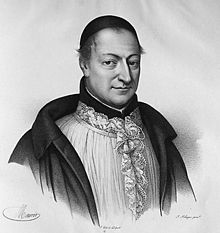| This article includes a list of general references, but it lacks sufficient corresponding inline citations. Please help to improve this article by introducing more precise citations. (October 2022) (Learn how and when to remove this message) |

François de la Chaise (August 25, 1624 – January 20, 1709) was a French Jesuit priest, the father confessor of King Louis XIV of France.
Biography
François de la Chaise was born at the Château of Aix in Aix-la-Fayette, Puy-de-Dôme, Auvergne, being the son of Georges d'Aix, seigneur de La Chaise, and of Renée de Rochefort.
On his mother's side he was a grandnephew of Pierre Coton, the confessor of Henry IV. He became a novice of the Society of Jesus before completing his studies at Lyon, where, after taking final vows, he lectured on philosophy to students attracted by his fame from all parts of France.
Through the influence of Camille de Villeroy, Archbishop of Lyon, Père de la Chaise was in 1674 nominated confessor of Louis XIV, who entrusted him during the lifetime of Harlay de Champvallon, archbishop of Paris, with the administration of the ecclesiastical patronage of the crown. The confessor united his influence with that of Madame de Maintenon to induce the king to abandon his liaison with Madame de Montespan. More than once at Easter he is said to have had a convenient illness which dispensed him from granting absolution to Louis XIV.

With the fall of Madame de Montespan and the ascendancy of Madame de Maintenon his influence vastly increased. The marriage between Louis XIV and Madame de Maintenon was celebrated in his presence at Versailles, but there is no reason for supposing that the subsequent coolness between him and Madame de Maintenon arose from his insistence on secrecy in this matter. During the long strife over the temporalities of the Gallican Church between Louis XIV and Innocent XI, Père de la Chaise supported the royal prerogative, though he used his influence at Rome to conciliate the papal authorities. He was largely responsible for the revocation of the Edict of Nantes.
He exercised a moderating influence on Louis XIV's zeal against the Jansenists, and Saint-Simon, who was opposed to him in most matters, does full justice to his humane and honorable character. Père de la Chaise had a lasting and unalterable affection for Archbishop Fénelon, which remained unchanged by the papal condemnation of the Maximes.
In spite of failing faculties he continued his duties as confessor to Louis XIV to the end of his long life.
Legacy
The name of Father de la Chaise became attached to the Jesuit house where he lived – at the time outside the boundaries of Paris – and to the plot of land near that house. In 1804, Napoleon established a cemetery there – the well-known Père Lachaise Cemetery (literally "The Father la Chaise Cemetery"). Thus, his name lives on in the Paris landscape.
The lexicographer Philibert-Joseph Le Roux had to flee to Brussels after he published Histoire du père La Chaize, jésuite et confesseur du roi Louis XIV où l'on verra les intrigues secrettes qu'il a eues à la cour de France et dans toutes les cours de l'Europe, a pamphlet against de la Chaise.
William Hurt portrayed Father de la Chaise in the fantasy-adventure film The King's Daughter (2022).
Notes
- ^ Chisholm 1911.
- LaSalle, Mick (January 21, 2022). "Pierce Brosnan, William Hurt save otherwise dumb 'King's Daughter'". Preview | Houston Arts & Entertainment Guide | Houston Chronicle. Retrieved 2024-06-05.
References
 This article incorporates text from a publication now in the public domain: Chisholm, Hugh, ed. (1911). "La Chaise, François de". Encyclopædia Britannica. Vol. 16 (11th ed.). Cambridge University Press. p. 48.
This article incorporates text from a publication now in the public domain: Chisholm, Hugh, ed. (1911). "La Chaise, François de". Encyclopædia Britannica. Vol. 16 (11th ed.). Cambridge University Press. p. 48.- Ott, Michael (1910). "François d'Aix de la Chaise" . In Herbermann, Charles (ed.). Catholic Encyclopedia. Vol. 8. New York: Robert Appleton Company.
- Régis Chantelauze, Le Père de la Chaize. Etudes d'histoire religieuse (Paris and Lyon, 1859).